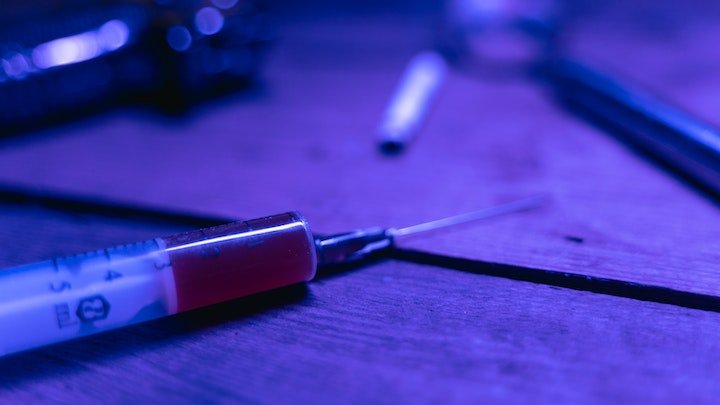It’s natural if you’re a ketamine user to wonder how long the substance stays in your system.
There’s quite a lot of helpful information available about this drug because of how it’s used in healthcare settings.
Interestingly, due to its use in medical care, there are incredibly varied ideas about ketamine use. As with all psychoactive substances, however, there is an addiction risk.
In fact, in 2021, the government reported that “ketamine use in the last year among adults in England and Wales [was] currently the highest on record“.[1]
Illegal and frequent ketamine use has serious implications for the person who becomes addicted.
As well looking at the duration of time the drug stays in different parts of your body, it’s useful to be aware of its long-term impacts and to have awareness of treatment options.
What is Ketamine?

Officially, ketamine is a dissociative anaesthetic used in healthcare and veterinary settings.
As well as being used as a general anaesthetic it’s increasingly used in ketamine therapy in the treatment of severe depression and alcoholism. Physically, it can lead to pain relief and sedation.
It’s also used illegally as a recreational drug due to its hallucinogenic and dissociative effects. In this way, users snort, swallow, or inject it. It’s available as a white powder, “crystals”, or as a liquid.
Due to its dissociative effects, it has been linked to sexual assault being used as a rape drug.
In the UK, it’s a class B drug (reclassified from a class C in 2014). Possession can lead to up to a 5-year prison sentence, and supply and production up to 14 years.
1. How ketamine affects the brain
Ketamine is often seen as being a “versatile” drug because it’s used by people in the party scene, but also in healthcare and relation to mental health.
It’s a substance that impacts the glutamate amino acid in the brain. This is the neurotransmitter that regulates the communication of cells and these effects of ketamine can be felt throughout the body, not just in the mind.
2. How do you metabolise ketamine
Ketamine is metabolised in the liver and mainly excreted through urine.
One study reported how it’s excreted through pee; “2% is excreted unchanged, 2% in the form of norketamine, 16% as dehydronorketamine and 80% as conjugates of hydroxylated ketamine metabolites with glucuronic acid”.[2]
Some ketamine metabolites are, however, left behind in the body. This is how it becomes traceable through a drug test.
3. The effects of ketamine
There are both psychological and physical symptoms a person under the influence of ketamine will experience when using it illegally.
- Increase in heart rate
- Increase or decrease in blood pressure
- Blurred vision
- Dissociative effects
- Hallucinatory effects
- Memory loss
- Panic attacks
- Impaired sense of time and reality
- Loss of appetite
- “K hole” where the person appears to be in a coma

4. How long does it take for you to feel the effects of ketamine?
The time ketamine takes to hit depends largely on how much you’ve taken, how you’ve taken it and various influences related to your sex, size, age, overall health etc.
Usually, however, ketamine users feel the effects within 3-4 minutes. It’s fast-acting.
5. What’s meant by the half-life of ketamine?
The half-life is how much time it takes for the concentration of ketamine to decrease from its maximum concentration to half of that.
Usually, this takes around 45 minutes. From there on, the body’s taken what it can from the substance and the “comedown” begins. For problematic ketamine users, this can lead to re-dosing.
It takes 5 half-lives for a drug to leave the system so for healthy adults ketamine’s half-life is between 3 and 4 hours. It is, however, still visible in drug tests.
6. How long does it take for the effects of ketamine to leave your body?
The length of time it takes for ketamine effects to wear off depends on how big the dose of ketamine was as well as, again, personal characteristics related to your sex, size, age, overall health etc.
Usually, though, the effects last from around 30 minutes to a couple of hours.
How Long is Ketamine Traceable in Your Body?

Despite how quickly the effects of ketamine wear off, it can remain in your body for much longer. Detection times are different according to the tests for ketamine that are carried out. Also, the substance stays in different parts of the body for different lengths of time.
As well as this, the duration of its remaining in your system is influenced by:
- Your age, sex, body mass
- Genetics
- Liver functioning
- How ketamine was taken
- How big the dose of ketamine was
- How frequently a person uses ketamine
The tests used and how long ketamine is traceable in various parts of the body include:
- Ketamine urine drug tests. This drug is mostly excreted in pee as metabolites. It flushes through the system more effectively if the person stays hydrated. Depending on the size of the dose, it can be traceable from a couple of days up to two weeks after use.
- A saliva test can reveal ketamine 24-48 hours after use.
- Ketamine can show up in a blood test 24 hours to 3 days later.
- Ketamine can be found in hair follicles through a hair test 7-10 days after use and can still be detectable 90 days later. This type of test shows whether ketamine has been used over some time.
- Nail testing can show traces of ketamine up to 12 months after use.
Is Ketamine Addictive?

For ketamine users who use the substance illegally, it’s well-known that some people develop psychological dependence.
Some use it recreationally at parties, clubs, and festivals, but for some this recreational use leads to heavy ketamine use and is seriously addictive.
When this happens, people can go on to develop severe physical and mental health symptoms. Anxiety, depression, and suicidal thoughts are common in addicted ketamine users.
As the person uses ketamine more often, it alters brain chemistry and develops new neural pathways which are what leads to habitual use.
This can be incredibly hard to stop. Due to how quickly people build up a tolerance to the drug, it’s very common for ketamine users to quickly start snorting gram lines. When addiction forms, users can easily do 25 to fifty grams in a week.
1. What are the withdrawal symptoms of ketamine?
Ketamine abuse and addiction lead to withdrawal symptoms which occur as the substance leaves the body. It’s a substance that causes a psychological addiction. This means that the symptoms experienced are related to the mind.
It’s useful to keep in mind, however, that due to behaviours while under the influence of the drug and because of the imbalance of brain chemicals and hormones, some of the withdrawal symptoms might feel physical.
K withdrawal symptoms include:
- Mood swings
- Irritability
- Feelings of depression
- Feelings of anxiety
- Severe cravings
2. The long-term health effects of ketamine use
The long-term influence of ketamine on the mind and body is very severe. It’s especially dangerous in how addictive use can lead to “multi-organ failure” related to the “brain, heart, liver, gastrointestinal tract, and genitourinary system“.[2]
Another study reported that in adults, “it induces severe psychomimetic reactions, namely hallucinations, delirium, nightmares, altered of short-term memory and cognition”.[3]
Addictive ketamine use can lead to:
- Abdominal pain
- Blood in pee
- Bladder pain (some long-term users are fitted with catheter bags where bladders have deteriorated)
- Deterioration in liver function
- Severe kidney damage
- Impaired memory
- Impaired cognitive functioning
- Impaired sleep and insomnia
- Low mood, depression, and suicidal thoughts
3. What are the signs of ketamine addiction?
There are various signs that a person has a ketamine addiction. These might be demonstrated through physical or mental health as well as social effects.
If you or someone you love is showing the following signs then it’s likely problematic and perhaps even addictive use has developed.
- Spending time with different people, including people who use ketamine
- Hiding, lying about, or being secretive about using ketamine, or how much and how often you’re doing it
- Feeling anxious, low, or having mood swings after you have used and then doing it again
- Experiencing sleep disruption or insomnia
- Lying to get, or stealing money to fund use
- Becoming increasingly unbothered about usual responsibilities
- Reduced motivation to go to school, college, or work
- Using more and more ketamine to feel an effect because you have developed a tolerance
- Experiencing cravings when you stop using and thinking about it a lot, as well as doing things to make sure you can get it
- Increased strain on family and friendship relationships as people become worried about your substance use, even if you disagree
- Participating in increasingly dangerous activities (i.e. driving while under the influence of ketamine)
What Treatment Options Are There For Ketamine Addiction?

If you have developed a ketamine addiction, there are several options for you about treatment. It’s important you make contact with medical practitioners because they’ll be able to assess your bladder, kidney, and liver health to start.
Some people opt for free NHS outpatient services. Here you get support from a caseworker who will do a few one-to-one sessions with you.
There are weekly groups that you can also attend. While there is support to help you quit ketamine, you need to bear in mind that NHS services are stretched.
Some people access Narcotics Anonymous which is a 12 Step group. This approach means you’ll be able to go to weekly peer-led sessions. NA provides an approach that emphasizes community and finding a higher power to drive your recovery.
Finally, the treatment option that is focused solely on equipping you to quit ketamine and achieve long-term sobriety is that offered by a private rehab clinic. These are inpatient services where you stay for some time to receive treatment.
You’ll be treated by a staff team who will address different aspects of your addiction to this dissociative drug. Time is spent unravelling the causes of the addiction as well as the things that maintain it.
Therapists will provide you with the tools needed that you’ll use to successfully manage cravings and triggers. Your time spent there will give you the optimum environment and space to practise the new behaviours
What Happens After Rehab When You Stop Using Ketamine?

After rehab, you’ll have an aftercare plan in place. This will have guidance on how to stay sober and how to make your life as meaningful as possible. Building a substance-free life means changing who you spend time with, trying out new hobbies and interests, and being committed to practising daily the skills you need to stay focused on abstinence.
Quite often, people find the initial month or two quite easy to remain sober. The new habits and thought patterns they’ve learned are still fresh. However, it can for some, lead to a false sense of security meaning they visit an old friend or think doing “one line won’t hurt”.
The truth is, what might seem like a simple act can lead you back into addiction. It’s imperative to realise that quitting means change in all areas for the long term.
Get The Help You Need Now
If you’re struggling with ketamine use and want to find out more about private rehab options, contact the OK Rehab team today.
References
[2] https://www.ncbi.nlm.nih.gov/pmc/articles/PMC4059572/
[3] https://www.ncbi.nlm.nih.gov/pmc/articles/PMC6197107/





